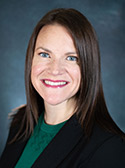
This transformation was inspired in part by her participation in the Governor's Teaching Fellows (GTF) program. Rountree applied to be a University of North Georgia (UNG) nominee for the annual program and was selected to be one of fourteen faculty members across the state to participate in the 2021-2022 Academic Year Symposia.
Rountree said she was "over the moon" when she found out she was chosen.
"When I read President Bonita Jacobs's letter of support as a representative on behalf of UNG, I was incredibly humbled," the Assistant Professor of English on the Oconee Campus said. "Teaching is my life's passion, and to have my record so proudly championed by Dr. Jacobs's was an honor indeed. By the time I found out I was chosen as a Governor's Teaching Fellow, you could have knocked me over with a feather. Me? A Governor's Teaching Fellow honored statewide? Get out of town!"
The GTF includes a combination of structured pedagogical and faculty development activities as well as self-directed activities designed to meet individual needs. Participants attend a three-day symposia held six times over the academic year. The Summer Symposium GTF fellows meet for a two-week symposium in May. All meetings take place on the University of Georgia (UGA) campus.
Rountree applied to the GTF Program to learn more about the scholarship concerning teaching in her disciplines of literature and gender studies, but that wasn't the only reason.
"I jumped at the opportunity to apply peer-reviewed research in my pedagogy as much as my course content," she explained. "The second reason I applied is because I relished the idea of returning to the classroom as a student, and the GTF Symposia seemed to offer a chance to be a student again with a cohort of professors who were equally motivated by the opportunity to improve their pedagogy, too."
Fellows focus on a particular course or project throughout the symposia. Rountree worked on her ENGL 2160 Multicultural American Literature course.
"I flipped the classroom, built choice into the capstone assignment, added more low-to-no stakes writing opportunities, and redesigned in-class activities to foster more community building and student engagement," Rountree said.
She made changes beyond the main project by implementing revisions to other writing courses: "I've taken the plunge into 'ungrading' using the Contract Grading technique. So far, it's been fantastic. My students are braver, more engaged, and less stressed than years passed. And I'm getting higher quality work out of them, too! All of these outcomes follow what the research suggests, but it took a lot of prep work and a little bit of courage to take the leap. I'm so glad I did."
Rountree's biggest takeaway from her time spent in the GTF program was that there are always other educators who are experiencing the same challenges and it is important to tackle these challenges together.
"My favorite experience was always the activities when our cohort would collaborate with a Fellow grappling with a challenge, whether how to structure a class project or how to pitch a new curriculum to their institution. The amount of teaching experience and passion in that room was incredible, and to have professors in medicine, marketing, art, and French all troubleshooting an issue in a sociology course – the result was magic."
Her student-centered teaching style, with an emphasis on creating "a fair, ethical, compassionate, and accessible classroom where every student can belong," is reflected in her teaching philosophy.
"I emphasize the process of writing and analysis over the product, and across all of my classes, I expose students to research, literature, and media from a variety of perspectives so that students get plenty of practice approaching wicked problems from a variety of different methods. I reject proscriptive teaching from the core of my being and, instead, see myself as a curator of their learning experience – a kind of tour guide through the journey of learning a new skill rather than an arbiter of quality (whatever "quality" even means)," she stated.
Rountree said that her students are her favorite part of teaching and she is always proud of their achievements at the end of the semester.
"English is a discipline that centers the human experience inherent in the humanities; we study communication, connection, conflict, and compassion. Sometimes our work is challenging; we have difficult conversations that arise from literature, media, and debates that animate our everyday lives. We disagree. We re-examine our assumptions in light of new evidence. And most of all, during this process, we get to know each other well. It's a wild ride, and they stick with it until the end."
The GTF Summer and Academic Year Fellowships applications are open now. The Summer Symposium deadline is Monday, November 7, 2022, and the Academic Year Symposia deadline is Monday, December 5, 2022. UNG can submit a total of two nominees for each fellowship. This nomination process is being facilitated by the UNG Center for Teaching, Learning, and Leadership (CTLL).